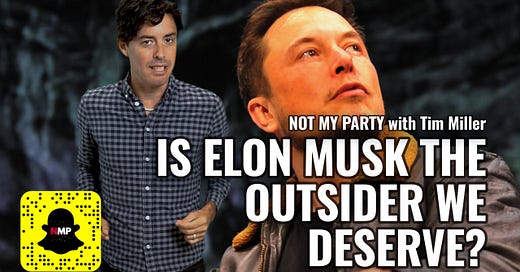
[Editor’s note: Watch Not My Party every week on Snapchat.]
Tim Miller: Not the political outsider we want, but maybe the one we deserve?
Elon Musk (playing Wario on Saturday Night Live): I am not the evil, I just am misunderstood.
Batman (from a CollegeHumor parody): What? Come on!
Miller: This is “Not My Party,” brought to you by The Bulwark. I always hear from fellow squishy centrists that we need an outsider to break up the two-party duopoly. In their minds, this imaginary person is sensible, pragmatic, with moderate political tastes—an American Macron.
Leonard Hofstadter (Johnny Galecki in The Big Bang Theory): Is that even possible?
Miller: Sadly, the voters here don’t really seem to dig that. The truth is if we are ever going to get a third-party candidate who can break up the political order, it will almost certainly be much crazier than the practical person of our dreams.
Video game characters: It’s a bird! It’s a plane!
Captain Kirk: It’s something so . . . completely different.
Miller: The candidate who might pull it off would likely have a problematic posting habit, a fondness of smearing people they don’t like as pedophiles, and a tabloid marriage that keeps them in the news. No, not that guy.
Alec Baldwin’s Donald Trump: Terrific.
Miller: This one. Musk is the rare, controversial firebrand who has popularity across partisan lines. He works for a company that can make a dent in climate change, while also ranting about political correctness on social media. He hates the social justice warriors, but it’s hard to see him saying “Onward Christian Soldiers” as well.
Mike Allen: Do you believe in God?
Dwight Schrute: I’ll take that as a no.
Miller: Though Elon’s most important trait isn’t ideological, it’s a mastery of mass communication in the modern age. Take, for example, how he inserted himself in this week’s new cycle. For some reason, Elon decided to troll his way into becoming Twitter’s largest shareholder.
Elaine Benes: Can he do that?
Jerry Seinfeld: He did.
Miller: So it was looking like Musk was going to join the company’s board, so that he could air his grievances about Twitter’s censorship practices. That’s what a typical investor would do: Work behind the scenes to get Twitter to stop with the overly politicized speech restrictions, like silencing the Hunter Biden laptop story I mentioned the other week, and then try to help the company grow so the investor could make more bank.
Stephano / Count Olaf (Neil Patrick Harris in A Series of Unfortunate Events): What a sensible idea.
Miller: Not Elon, he was reminded that board members have, ya know, fiduciary responsibilities.
Jonah Simms (Ben Feldman on Superstore): That sounds incredibly not fun.
Miller: And that those obligations to the company might hamper his ****posting, which was one reason why he backed out at the last second and then sent a lengthy Twitter thread about how terrible the company that he was investing millions in really is.
Pepper Brooks (Jason Bateman in Dodgeball): It’s a bold strategy, Cotton, let’s see if it pays off for him.
Miller: This shows that Elon understands his most valuable asset is command of the attention economy.
Musk: Where are the aliens? Maybe they’re among us. Some people think I’m an alien.
Miller: He is rewarded by blowing **** up for the lolz and creating drama. Not by being practical and trying to nudge things along.
Miller: I reinvented electric cars, and I’m sending people to Mars in a rocket ship. Did you think I was also gonna be a chill, normal dude?
Miller: It’s the attention economy that fuels his ability to send rocket ships to the moon, both figuratively and literally. And sometimes his attention-hogging is good, like when SpaceX helps Ukraine get internet access. And sometimes it’s bad, like when he’s downplaying a pandemic that killed millions. But no matter what you think about his hot takes, as a business matter, the strategy’s working.
Musk: I don’t really have a business plan.
Miller: Check out this chart from my colleague at The Bulwark a few months back. Tesla is worth more than GM, Ford, Honda, and Toyota combined, despite selling the fewest cars of all. The reason is partially investors betting on the future, but it’s also because Elon dominates the meme marketplace with his fanboys. So could that type of populist, contrarian, trolling ethos disrupt politics the way it did the auto industry?
Musk: We don’t think about it at all really.
Miller: I think the answer is yeah, with the right messenger.
Shrek: Really?
Donkey: Really, really.
Miller: Unfortunately for Elon, but probably fortunately for the rest of us, he’s not an American, so he can’t do this himself, at least on the presidential level, as long as that rule stands
Arnold Schwarzenegger (in Hercules in New York): I am tired off the same old faces.
Miller: But when thinking about a future where a new politician, unshackled from the two parties, offers a third way, look to an iconoclast like Musk as the model—not the studious teacher’s pet that some of us might prefer.
Musk: Okay. I’m not sure I want to be me.
Frank Reynolds (Danny DeVito in It’s Always Sunny in Philadelphia): You’re full of shit.
Miller: See you next week for more “Not My Party.”











